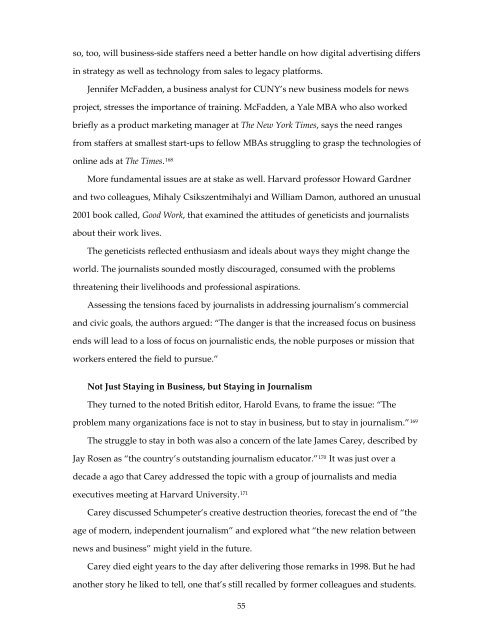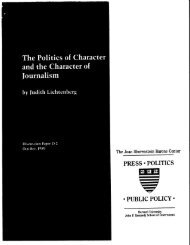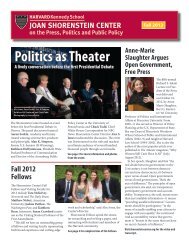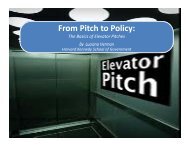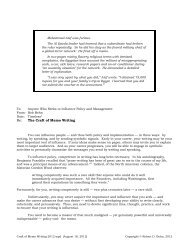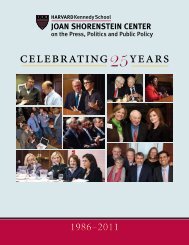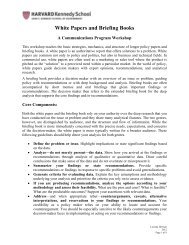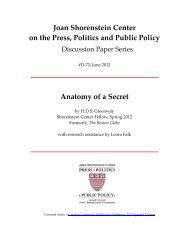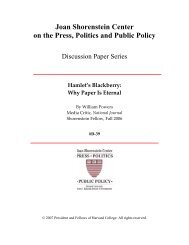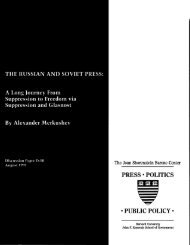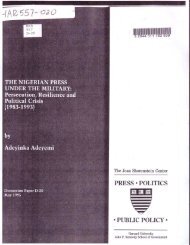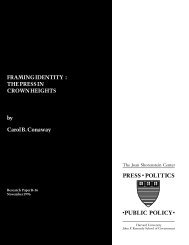A User-First Framework for Sustaining Local News - Harvard ...
A User-First Framework for Sustaining Local News - Harvard ...
A User-First Framework for Sustaining Local News - Harvard ...
Create successful ePaper yourself
Turn your PDF publications into a flip-book with our unique Google optimized e-Paper software.
so, too, will business‐side staffers need a better handle on how digital advertising differs<br />
in strategy as well as technology from sales to legacy plat<strong>for</strong>ms.<br />
Jennifer McFadden, a business analyst <strong>for</strong> CUNY’s new business models <strong>for</strong> news<br />
project, stresses the importance of training. McFadden, a Yale MBA who also worked<br />
briefly as a product marketing manager at The New York Times, says the need ranges<br />
from staffers at smallest start‐ups to fellow MBAs struggling to grasp the technologies of<br />
online ads at The Times. 168<br />
More fundamental issues are at stake as well. <strong>Harvard</strong> professor Howard Gardner<br />
and two colleagues, Mihaly Csikszentmihalyi and William Damon, authored an unusual<br />
2001 book called, Good Work, that examined the attitudes of geneticists and journalists<br />
about their work lives.<br />
The geneticists reflected enthusiasm and ideals about ways they might change the<br />
world. The journalists sounded mostly discouraged, consumed with the problems<br />
threatening their livelihoods and professional aspirations.<br />
Assessing the tensions faced by journalists in addressing journalism’s commercial<br />
and civic goals, the authors argued: “The danger is that the increased focus on business<br />
ends will lead to a loss of focus on journalistic ends, the noble purposes or mission that<br />
workers entered the field to pursue.”<br />
Not Just Staying in Business, but Staying in Journalism<br />
They turned to the noted British editor, Harold Evans, to frame the issue: “The<br />
problem many organizations face is not to stay in business, but to stay in journalism.” 169<br />
The struggle to stay in both was also a concern of the late James Carey, described by<br />
Jay Rosen as “the country’s outstanding journalism educator.” 170 It was just over a<br />
decade a ago that Carey addressed the topic with a group of journalists and media<br />
executives meeting at <strong>Harvard</strong> University. 171<br />
Carey discussed Schumpeter’s creative destruction theories, <strong>for</strong>ecast the end of “the<br />
age of modern, independent journalism” and explored what “the new relation between<br />
news and business” might yield in the future.<br />
Carey died eight years to the day after delivering those remarks in 1998. But he had<br />
another story he liked to tell, one that’s still recalled by <strong>for</strong>mer colleagues and students.<br />
55


